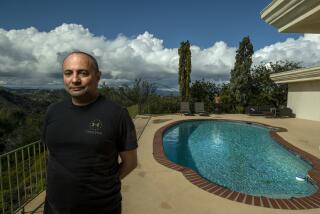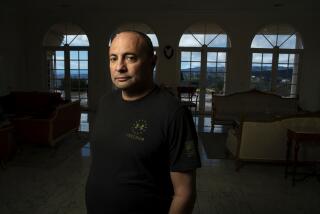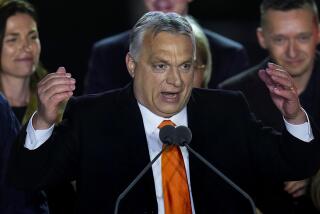Selling communism to the U.S. masses
- Share via
WASHINGTON — It was a classic “who’d have thunk it” moment in political history: The leader of the Communist Party of the Russian Federation--standing on a red, white and blue stage at American University in the capital city of the Free World--defending his communist credentials.
Stranger still was Gennady A. Zyuganov’s insistence that there was nothing the least bit peculiar about the situation.
Zyuganov, who finished second to Boris N. Yeltsin in Russia’s presidential election last year, even tried with a straight face to deny any contradictions between traditional communist values and his capitalistic U.S. speaking tour.
“There is no conflict between the two,” he insisted. “Communism means communal values over individual values, and I support that,” he added in a rather weak defense of his guiding political philosophy.
All of which may have been Zyuganov’s way of indicating that Russia’s still-influential communist leaders are more than willing to subordinate their ideology to their country’s need to attract foreign investment--and, perhaps, to their own ambitions.
“I am quite confident that we will create conditions that will encourage American investment in Russia,” Zyuganov said at a meeting with the U.S.-Russia Business Forum. “I understand very well that without the due legislative framework and without securing the personal freedom, there would be no massive investment.”
Following the example of former Soviet leader Mikhail S. Gorbachev, Zyuganov has just wrapped up a speaking tour of the United States. In New York, Washington and Houston, he met with business leaders, students, the media and State Department officials.
Gorbachev was just the first of several Russian political figures who have traveled here publicizing their political views, enhancing their prestige at home and abroad and--not coincidentally--lining their pockets with American cash.
Not too long ago, the whole idea of “communists on tour” would have conjured up images of aging radicals, near-empty meeting halls and tin-cup collections. But Zyuganov’s tour is equal parts unofficial diplomacy and serious business.
Zyuganov, like Gorbachev, is represented by the American Program Bureau, a group that represents national and international figures. And, just as Alexander I. Lebed, Yeltsin and other Russian political leaders have done before him, Zyuganov hopes his U.S. visit will help him at home.
“Zyuganov wants to show that he is an international political personality, not just a provincial Russian politician,” said Joseph Nogee, professor of political science at the University of Houston and author of the 1996 book “Russian Politics: The Struggle for a New World Order.” “It is advantageous for every Russian leader to demonstrate that they can work with the ‘big boys’ of international politics.”
Although Zyuganov has stated support for such anti-communist concepts as private ownership and personal freedom, this does not necessarily signify that the Communist Party in post-Soviet Russia has changed. According to Nogee, Zyuganov tailors his message to his audience.
“Zyuganov has always sent out contradictory messages. During his campaign for the presidency, he promised foreign business leaders greater access to Russian markets while at the same time telling the Russian people that he would fight the exploitation of the Russian people by foreign capitalists,” Nogee said.
In Washington, Zyuganov met at the State Department with John Herbst, deputy coordinator for new independent states. While Zyuganov likely harbored hopes of influencing U.S.-Russian relations, the State Department received him in an unofficial capacity only.
“We had an in-depth discussion on the political situation in Russia,” Herbst said in a statement released after the meeting. “NATO enlargement will proceed and it is not a threat to Russia.”
Zyuganov said his opposition to NATO expansion, which he believes will revive East-West tensions--is shared across the political spectrum in Russia.
“I believe that if we will go into the next millennium having the psychology of the Cold War, we will cause again the lack of trust in the world community,” he said.
Zyuganov spoke with students at five American colleges. The party leader was well-received by about 2,000 students at American University, where he answered questions about NATO, the history of communism and the future of Russia.
More to Read
Sign up for Essential California
The most important California stories and recommendations in your inbox every morning.
You may occasionally receive promotional content from the Los Angeles Times.













